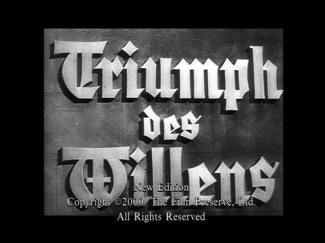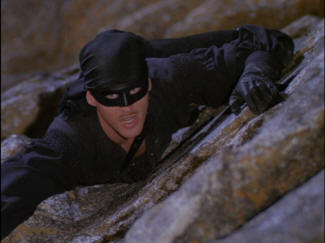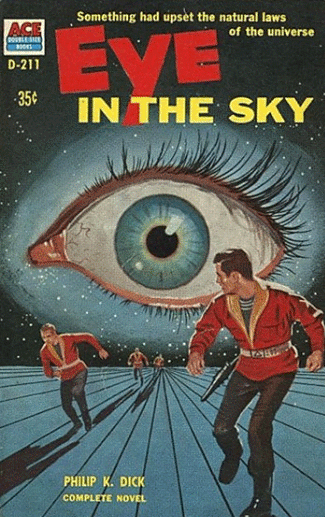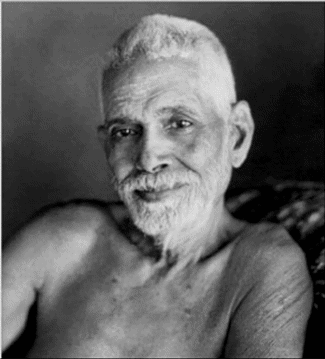
Chapter One -- "Triumph of the Will"
Charkoff tied the silk tie with its small pattern round his neck, eyeing himself in the mirror. He loved the satiny glow of an immaculate white spread collar. Tired and buzzed simultaneously, as he always felt after too little sleep, after too much work, his mind was pulling the pieces of the trial in progress together like a jigsaw puzzle with innumerable pieces. His body was dragging as his mind raced, and his sense perceptions felt distant and tenuous.
In the elevator a woman in a striking black dress got on. Charkoff caught the impression of dark hair, gold earrings, a strange perfume that had a peppery edge that he didn't really want to breathe.
In the lobby he felt woozy, and leaned against a marble pillar topped with a pseudo-classy bust. Horrible decorating in the common areas. Recovering from what he assumed was the deceleration effect of the elevator ride, he aimed himself for the light spilling through the glass entry door. Air was what he needed.
The flavor of smog greeted him as a bus pulled away from the curb. He was reeling again, and lurched toward the blue mailbox for support.
Jimmy the doorman saw Mr. Charkoff slide limp to the pavement, like a fried egg slipping off a spatula. Jimmy called the paramedics, and they arrived nearly instantly, gathering Mr. Charkoff into the red and white van with meticulous speed. They didn't even talk to anyone; just raced away without a word. Then a short while later, some more paramedics arrived. There was a lot of confusion, since no one knew who the first paramedics were.
***
In the back of the paramedic van, the dark haired woman was looking through Charkoff's wallet. "Nat Charkoff, litigation partner at Brown & Steele - -antitrust section -- that's our boy." She stripped the clothes off Charkoff's inert body, covered him with a sheet and a blanket, emptied the pockets into a pile of items, removed his ring and watch, added them to the pile, and slipped all the items into a zippered bag.
"Time for some medicine," said the woman's companion, holding an oxygen mask over Charkoff's face. He was blonde, balding, with a beard, and he monitored a small gauge on a tank labeled Oxygen, which did not contain oxygen. He checked Charkoff's pulse. He looked like a paramedic.
The driver, a thin-faced latino with blue-black hair in light blue overalls, guided the van smoothly onto the freeway. He kept up with traffic, heading east over the hills out of Los Angeles, into the desert.
***
He woke to resounding quiet, and light pouring through windows set high in the wall. Something came to him with a ferocious sense of certainty. Paranoia. This situation was not of his making. He had not chosen to be here. The concept of choosing was important. The walls were against him. Behind the mirror over the sink, someone was watching. He would not look in that direction. They were holding him against his will. He tried to form the syllables of his name, but they would not come. His teeth began to chatter. It was terribly cold, he realized, and began to burrow into the covers, like a soft hole. And the world drained into him faster and faster like a whirlpool of recollected pain. Translucent thoughts floated round him, thick like fishes under the sea, and it was impossible to sort them out, there were so many, so terribly very many.
Next morning, or next week, he smelled coffee as he woke. It was on a little table near the door of the room, on a tray. He would drink it in a while. He closed his eyes and groped backward in time for the last recollectable event, the trial. He felt for the jigsaw pieces of facts, closed his eyes to review the parade of witnesses, evoked memories of numbered documents, but all of it slipped away, like oil through a screen. The images came, but would not stay, and try as he might, he still could not form the syllables of his own name. Sitting on the edge of the bed, he drank the coffee, and it tasted very good, massaging the cells of his brain as it twisted bitterly in his mouth.

Next day it was different. Something came to him with a ferocious sense of certainty. Paranoia. He realized this situation was not of his making. He had not chosen to be here. The concept of choosing seemed terribly important. The walls were against him, he knew. Behind the mirror over the sink, someone was watching. He would not look in that direction. They were holding him against his will. "Against my will," he repeated again and again.
Chapter Two -- Dialogue
The door opened. She walked in, tall, aristocratic, dark. Seemed to remind him of someone -- it came to him quickly -- the woman in the elevator with the awful perfume. He felt a little woozy for a moment just from the memory.
She walked straight in and pulled herself up the one plastic chair in the whole room besides his bed and sat down. She looked at him and fished in her lapel pocket. She pulled out a joint and lit it, drawing in a big lungful of a toke and blew it out, extending the joint to him with a "do you want any?" look. He shook his head in a neat little jerk. He wanted his head clear. It had been a fog for longer than he had any conception of. Just a week ago he'd snapped out of it, though. They'd cut the drugs, and like a body in suspended animation floating a thousand feet beneath the sea, he'd risen up out of the depths to a brightness of perception that was a huge relief, a breath of clarity as big as the sky.
He knew who he was -- a trial lawyer at the top of his game, sidelined by some fucking insane kidnap scheme that apparently had all the time and money in the world to fuck with him, even to utterly neglect him. He changed his mind and reached out for the joint. What the hell.
It tasted damn good, and if he was going to have to smell it, he might as well get high. He never lost much of his natural speedy-mindedness from a hit of pot, and his interrogator, or whoever this was, she would be high, too. So they would keep parity. He was about to speak, then caught himself. Let her speak first.
She did. "Sorry about the heavy doping. Couldn't be helped. Had to transport you like a piece of equipment, so we had to ice you down. Then my brothers and sisters here thought you were supposed to be treated like a regular zeck, so they kept you on the program. I told 'em to dry you out so we could chat productively."
"So what the fuck is going on?" he asked.
"Just a total reorientation of your life. You were a boss, now you're not. People ate your shit, now you eat theirs."
He wanted to leap out of his chair and batter her face into a pulp, but not really. Her eyes looked at him with knowledge older than the barely-thirty appearance that ran true to some arrogant bloodline -- high cheekbones, eyeliner, chiseled jaw, dark brown eyes, lips naturally red and full. She looked like some retro image of an anime private investigator with a greyhound for a pet as she lounged, long and relaxed, in the crappy chair.
She said more. "I have no idea if this will work, but I'm going to try." She raised her right eye and its arching brow to peer significantly at whoever was operating the video camera mounted above his bed, then lowered it to focus on him entirely. "I want to recruit you. You're smart enough."
"Bullshit," he replied, "this is just a gambit."
"Nope," she said, "it's the last gambit. The vote's been taken on you. No one thinks you are a regular zeck. You're too fucking smart. You've got warrior game instincts that make you too dangerous to let loose into the regular program. You'll spoil a whole class of zecks if we give you half a chance. And nobody graduates from this program unconverted. So you see?" She raised her hands palm-up. "It's your only chance to graduate. But don't consider that a threat."
She got up to leave, took a step toward the door, then stopped and turned back to him, extending the half-smoked joint. "You want the roach?' she said, smiling. He shook his head. She kept smiling and said, "Just remember that story about the tiger and the strawberries. I know it's your favorite."
Chapter Three -- Split
For once in his life, he felt underinformed. He'd always known too much. Every scheme he'd run across in life, it hadn't been long before he'd figured it out. But this one here, he hadn't figured out yet. A mighty strange kidnap scheme, you'd have to say. He wasn't worth a ransom, and there was no one who could pay it. His mother in Florida? She loved his visits, but she loved her card games with people her age just as much. Mom was great, but she'd been steadily losing her shine over the last four years she's spent in assisted living. His sister? They talked four times a year, to wish each other happy birthday, Merry Christmas, and Happy Thanksgiving. No, nobody was going to ransom him.
What about his clients? No doubt they had already filed a claim against his malpractice insurance for disappearing in the middle of a major trial. The judge had undoubtedly halted the trial while things got straightened out. Which they would. Courthouses were like the waters of the Red Sea when Moses lead the Israelites through, and Pharaoh's soldiers followed – only half the people who walked in ever walked out. A dismal business, on the best of days, carving acceptable outcomes from intransigent materials, trying to serve humans with inhumane rules. How long had he been at it? Twenty years.
He got up from the bed and looked at himself in the mirror. He looked younger than the fifty years that had piled up behind the smooth brow, but as he stared into his own eyes, the truth was there. As he stared into the well of his own pupils, he felt as if he were looking down a long, dark corridor that angled down into a dark, empty cavern, hollow, booming with silence – his heart. The hollow, empty feeling persisted as he kept peering at himself, fiercely, as if he were cross-examining himself for the truth. He felt himself squirm away from the question that he now heard in the hollow space of his chest. Why? Why? Why had he been living this way? Why?
The answers started coming to him. He had been afraid to be trampled by the herd. Pushed around by bullies in school, he remembered with a flush of hatred the faces of derision and scorn. Kids who stole his lunch money, who turned his book bag upside down, who scattered his papers and broke his pencils. Kids who would trip you when another guy pushed you. Little gangs of demonic idiots who mysteriously bubbled hatred like poisonous fountains. They had better teachers at home, he suddenly realized – fathers who bullied them, mothers who added the high notes to the chorus of contempt, siblings who teased, taunted, and tormented their own.
The nauseating experience of childhood left him yearning for the order and decency of adulthood. As he climbed the ladder of authority, each door of achievement placed one more barrier between him and the atavism of the playground. As he progressed through undergraduate school, he saw the violent fools winnowed out of the student body as their inherent low-class talents drew them into dead-end jobs and tawdry lives. Then he got into law school, and began meeting the children of the real predators, the steel-toothed sharks for whom privilege was passe and excellence was an option. At some point, he realized he'd made the cut, and he was going to be a lawyer, a damned good one.
He thought he knew what that meant at first, although he was amazed at the apparent triviality of the matters he was handling. There was a surprising amount of fighting for fighting's sake. There was obstinacy, an unwillingness to admit the truth. Often he found himself contending the preposterous – in briefs, in arguments, in discussions with other lawyers. But he had a gift for making everything sound reasonable, or for making his opponents look foolish. Either way, the results spoke for themselves. His clients were happy, his promotions were frequent, his partnership was assured, and then, it was granted. His ascent through the corporate legal machinery seemed pre-ordained. Even the scions of the wealthy gave him that.
Suddenly, he felt observed. Whipping around to fix the obvious camera eye with his finger and angry stare, he shouted, “Fuck you! Fuck you! You know nothing! Nothing!” And at that moment, he split. One half of him ran across the room, grabbed up the molded plastic and metal chair, and hurled it at the camera. The other half seemed to stay inside the face in the mirror, watching his back, his flailing arms, the arching flight of the chair as it struck and bounced off the wall, his collapse onto the floor, his angry pounding of the cold, concrete. The face in the mirror thought to itself, “He is not going to make it.”
Chapter Four -- Healing
As Clovis watched the surveillance cam, Charkoff flailed and pounded the floor. She squinted. It was hard to watch, like something inside him was unwinding, something that had been screwed up inside so tight that the thought of ever reversing the flow had been utterly forgotten, and there been only one right way, forever and ever and ever, until now, and the lynchpin had broken, and it was all coming undone.
The precise work of the extraction unit, and the scrupulous sense deprivation regimen since then, had disrupted his connection with his sense of self. The theatre had been handled properly, so a long time period hadn't been required. The breakdown of a personality can be accelerated considerably by exhaustion and convincing the captive that the unthinkable has occurred – they have been captured by well-organized fanatics. Which was of course the truth. She had delivered the ultimatum at the right time, and left right before the pharma group introduced an bio-engineered dissociative in an aerosolized medium, actually more of a spore than a chemical delivery system. Kicks in very quickly, related to neurotoxins but not toxic, and generates pseudo-doppelganger states of awareness. If a personality has a shadow it will turn the contrast way up, and stimulate a crisis, opening the potential for conversion. It was, she thought, her favorite way of winning an argument. Proving you were right all along.
Soon a man and a woman in white outfits came in and picked up the body on the floor and laid it on the bed. Seeing them, Clovis clicked her screen and brought up a menu of captives. Ah, yes, Lindsay deserves a visit, she thought to herself, leaving thoughts of Charkoff behind.
The woman checked his pulse, while the man covered him with a light blanket and put a glass of ice water on the nightstand next to the bed. The woman pulled a syringe out of her apron pocket and administered an intramuscular sedative.
“Whadja give 'im?” asked the man, a young hispanic.
“Ketamine,” the girl mumbled.
“What's that do?”
“He'll feel like he went to God's own dentist, that's what.”
“Really?”
“Hell, I don't know. I just give 'em the shots.”
After the girl walked out, the boy turned back for a last look, then shook his head and whispered, “Pobrecito.”
The face in the mirror continued watching the body of the man who had come undone.
The face in the mirror cared about the man who had come undone. He felt that he knew him, that he wanted to help him. From the depths of the mirror itself, the face experienced a recognition – he was this man lying still in the bed. The room kept getting brighter.
Chapter Five -- Development
“We can't always know the right decision for sure, and in fact trying to know it before we take it, under some conditions, will lead to disaster. But in every circumstance, there is an optimal path of action, and we train to put that into action at all times.” concluded Charkoff, ending his presentation. Warm applause from the twenty or so listeners brought a smile to his bearded face. It had been two years since he converted, and the group had been good for him. His mind was clear, as clear as if a mirror had been wiped clean to reveal what always been there. He knew without a doubt that the tide of history had turned, and he was just a little bit ahead of a change that was cresting all over the world.
The Vengeance itself had turned out to have relatively short-lived effects on the larger society, but the conversion rates had been astonishing. Less than forty-seven percent had been washed out, which was quite a few people who had their memories chemically wiped, were assigned the identities of sundry dead people on their official identifying documents, and released on skid rows, in rural backwaters, and slums around the world. None of those people had caused any trouble, nor had they been killed. As Clovis said simply, they got what was coming to them.
The main lesson learned was that there was a market for what they were offering. With conversion rates over fifty-percent, the resulting crew agreed that the business of forcible recruiting should be continued. Charkoff had been scooped up in the wave of actions started by the first generation of group members. He was in the second generation of converts, and concerned with masterminding new extractions.
Clovis walked up to him at the podium. “Well, how is my little nestling?”
“Flapping his wings with increasing confidence. You're back from London. How's funding coming?”
“Better and better. Some of the major banks are being hollowed out to fund our work. We'll profit even more abundantly when they collapse. Lawyers!” Clovis gestured and laughed.
“Don't tell me, I used to be one. I much prefer being a man at arms. I have far more aggression than can be channelled in a blue, pin-striped suit. Of course, you knew that, didn't you?”
Her smile wrinkles around her eyes crinkled under red bangs, her lips pressed together, then she clapped him on the forearm and said, “I had my eye on you for quite a while. Strategists are born, not made, and we need a growing number of them. Like any organization, even if we try to stick with our core competency, we run a risk of growing too fast. Extractions are a risky business, with high potential for profit, and it is how we have grown. Where risks are high, strategy is the only way to even the odds.”
“Which is just to say that if you want to get good, you have to play a lot.”
“Yes, and what kind of play have you got planned?”
“I think we're ready to go for Tru Manley.”
Clovis nodded appreciatively. “The NewsFix anchorman – the Fix at Six.”
“Exactly.”
“Well, he'll be missed.” She tilted her head.
“Can't be helped.”
“Mmmmnnn,” she set down her bag and perched with her thigh on the edge of the table where the podium had been placed, and cocked her head even more, “You have talked with Turabi about this?”
“Yes, he's on board.”
“Okay, just asking.” She paused. “Can I take a look at that file? I didn't know you were working on this. That's a big move to make.”
“Why would I try for less?”
“Yes,” she nodded, “why would you?”
© Tara and Charles Carreon 2008





